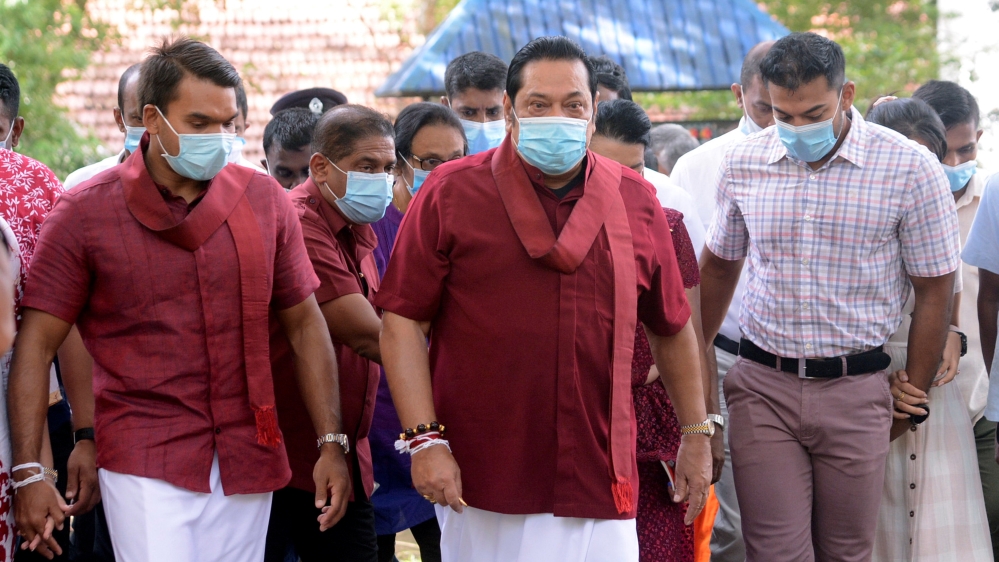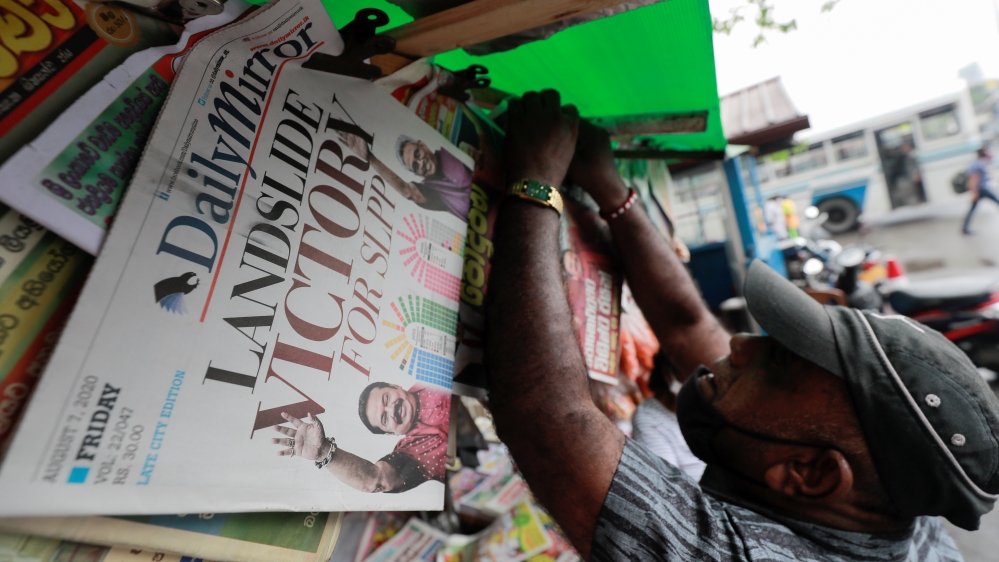Rajapaksa brothers win by landslide in Sri Lanka’s election
Huge parliamentary win could enable the president and his brother to change the constitution and boost dynastic rule.
![Rajapaksa brothers win by landslide in Sri Lanka's election Critics fear the Rajapaksas want to end presidential term limits, bring the judiciary and police under their direct control, and extend their dynastic power to a new generation [Dinuka Liyanawatte/Reuters]](https://www.aljazeera.com/mritems/imagecache/mbdxxlarge/mritems/Images/2020/8/7/aae9047455f04ca8833ab5f03a818f06_18.jpg)
Critics fear the Rajapaksas want to end presidential term limits, bring the judiciary and police under their direct control, and extend their dynastic power to a new generation
Sri Lanka’s powerful Rajapaksa brothers have secured a landslide victory in the country’s parliamentary election, according to final results.
Prime Minister Mahinda Rajapaksa’s Sri Lanka Podujana Party (SLPP) won 145 seats and can also count on the support of at least five allies in the 225-member legislature, according to the results released on Friday.
The SLPP’s main opponent obtained just 54 seats in Wednesday’s vote, which saw more than 75 percent of the 16.2 million eligible voters cast their ballots.
The prime minister is most likely to be sworn in the same position by his younger brother, President Gotabaya Rajapaksa, and the huge win on Friday could enable them to change the constitution and strengthen the dynastic rule.
“Sri Lanka People’s Front has secured a resounding victory according to official results released so far,” Gotabaya Rajapaksa said in a Twitter message. “It is by belief that that the expectation to have a Parliament that will enable the implementation of my ‘vision for prosperity’ policy will be reality tomorrow.”
Critics fear the siblings – renowned for their crushing of Tamil separatist rebels to end a decades-old conflict in 2009 – want to end presidential term limits, bring the judiciary and police under their direct control, and extend their dynastic power to a new generation.
Sri Lanka’s opposition has accused the government of corruption, censorship and intimidation.
Al Jazeera’s Minelle Fernandez, reporting from the capital, Colombo, said despite criticism of “authoritarianism and dominance” people have opted for the governing party.
“Mahinda Rajapaksa was voted out of office essentially just one term ago. The previous government came to power on the promise of change but it failed miserably. They did carry forward some constitutional reforms but ultimately, they were such a big disappointment that people of this country have gone back to the Rajapaksas.
“The handling of coronavirus crisis by President Gotabaya Rajapaksa has invoked a lot of confidence in the people in contrast with the shambles the last government made following the Easter bombing attack last year.”
The Indian Ocean Island has largely contained the spread of the novel coronavirus with 2,839 confirmed cases, including 11 deaths.
|
|
However, analysts say any attempt by Gotabaya Rajapaksa to push for changes that will strengthen presidential power at the expense of those of the prime minister may trigger sibling rivalry.
Gotabaya was elected president last November after projecting himself as the only leader who could secure the country after bombings of churches and hotels on Easter Sunday killed 269 people in 2019.
Since being elected, he has said he had to function under many restrictions because of constitutional changes in 2015 that strengthened Parliament and the prime minister and put independent commissions in charge of judiciary appointments, police, public services and the conduct of elections
Mahinda Rajapaksa is unlikely to cede any of his powers that might shrink his influence as he works on promoting his son, Namal, as his heir. Namal and three other members of the Rajapaksa family contested the election and are likely to control key functions in the new administration.
The election has left the splintered opposition decimated.
Former Prime Minister Ranil Wickremesinghe lost his constituency, and his party, which had 106 seats in the outgoing parliament, was reduced to just one seat.
A breakaway faction from Wickremesinghe’s party headed by the son of assassinated President Ranasinghe Premadasa, Sajith, got 20 percent of the vote and was a distant second with 54 seats.
The moderate Tamil National Alliance (TNA) which had 16 seats in the outgoing parliament, also suffered badly and was left with just 10 seats in the new assembly, which is due to sit on August 20.
A total of 196 seats in the 225-member house were decided on district proportional representation while the remaining 29 were decided on the basis of votes polled nationwide.
The election was originally scheduled for April, but it was twice postponed because of the COVID-19 pandemic.






